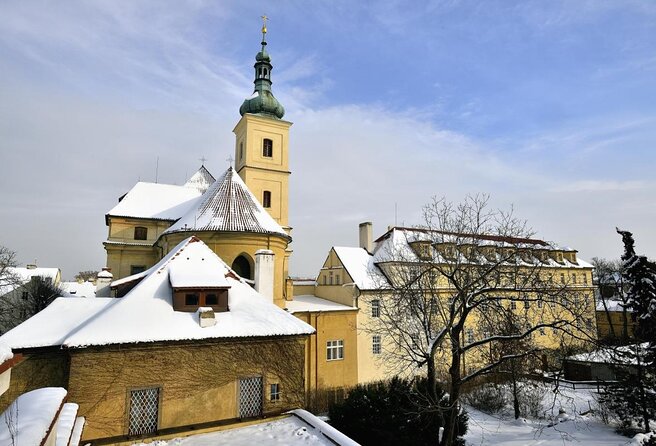Introduction:
St. Vitus Cathedral, also known as 聖ヴィート教会 (Kostel sv. Víta) in Czech, stands as an epitome of architectural grandeur and spiritual significance in the heart of Prague, Czech Republic.
With its soaring spires, intricate sculptures, and stained glass windows, this Gothic masterpiece has captivated visitors for centuries, drawing them into a realm where history, art, and faith converge harmoniously. Let’s embark on a journey to unravel the mystique and marvel of St. Vitus Cathedral.
A Testament to Faith and History: Construction of St. Vitus Cathedral began in the 14th century, under the patronage of Charles IV, the Holy Roman Emperor and King of Bohemia.
However, the cathedral’s completion spanned several centuries, witnessing the reigns of numerous monarchs and the evolution of architectural styles. Its foundation stone was laid in 1344, but the structure was not consecrated until 1929, symbolizing the cathedral’s enduring presence across epochs of change and turmoil.
Architectural Splendor: The cathedral’s architecture is a testament to the ingenuity and craftsmanship of medieval artisans. Its soaring spires pierce the sky, reaching heights that inspire awe and reverence. The intricate stone carvings adorning its façade depict scenes from biblical narratives, saints, and monarchs, offering a visual tapestry of religious devotion and cultural heritage.
One of the most iconic features of St. Vitus Cathedral is its breathtaking stained glass windows. These luminous works of art depict biblical stories, saints, and intricate geometric patterns, suffusing the interior with a kaleidoscope of colors and light.
Among them, the Rose Window stands out as a masterpiece of Gothic stained glass craftsmanship, mesmerizing visitors with its intricate design and vibrant hues.
Sacred Treasures Within: Stepping inside St. Vitus Cathedral is akin to entering a sanctuary of spirituality and serenity. The cavernous nave, with its soaring vaulted ceilings and slender columns, exudes a sense of divine grandeur. As sunlight filters through the stained glass windows, the interior is bathed in an ethereal glow, inviting contemplation and reflection.
The cathedral is also home to a wealth of sacred artifacts and relics, including the tomb of St. John of Nepomuk, a revered Czech saint. The Chapel of St. Wenceslas houses the relics of the patron saint of Bohemia, adding to the cathedral’s significance as a place of pilgrimage and devotion.
Preservation and Restoration Efforts:
Over the centuries, St. Vitus Cathedral has weathered wars, fires, and the ravages of time. Yet, thanks to ongoing preservation and restoration efforts, this architectural marvel continues to stand as a beacon of faith and heritage.
Skilled artisans and conservationists work tirelessly to repair damage, conserve fragile artifacts, and ensure that future generations can continue to marvel at its splendor.
Visitors’ Experience: For visitors to Prague, a visit to St. Vitus Cathedral is an essential pilgrimage. Guided tours offer insights into the cathedral’s history, architecture, and spiritual significance, allowing visitors to appreciate its beauty and significance on a deeper level.
Climbing to the top of the cathedral’s towers offers panoramic views of Prague Castle, the Vltava River, and the city skyline, providing a unique perspective on this historic city.
Conclusion:
St. Vitus Cathedral stands as a testament to human creativity, faith, and resilience. From its soaring spires to its intricate carvings and luminous stained glass windows, every aspect of this Gothic masterpiece speaks to the enduring power of art and spirituality.
As visitors wander through its hallowed halls, they are transported through time, connecting with centuries of history and tradition. In an ever-changing world, St. Vitus Cathedral remains a steadfast symbol of beauty, inspiration, and transcendence.

